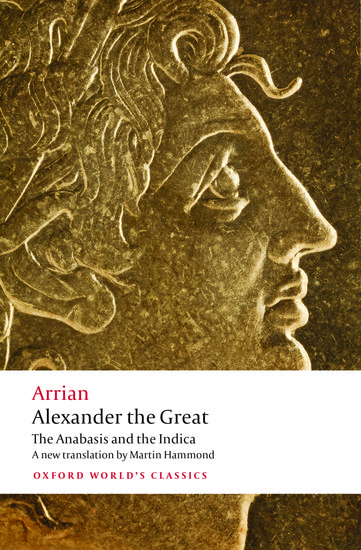
Alexander the Great, Leader of the Macedonians, was born in 356 BC. After his death from fever on 10 June 323 BC, his dominion fell apart, the most lasting tribute to his achievement being the town of Alexandria, Egypt. We present the following extract from John Atkinson’s introduction to the new Oxford World’s Classics edition of Alexander the Great by Arrian, which highlights the importance of Alexander’s reign in world history.
The relatively short reign of Alexander (336 to 323 BC) marked one of the major turning-points in world history. The Greek city states continued to function after his death, but the world order had changed and a new era began, which came to be labelled the Hellenistic period. For Alexander, like many an autocrat, departed without leaving a viable succession plan. The senior officers who had survived the normal hazards of war and Alexander’s paranoid suspicions were not united in purpose. Known as the Successors (Diadochoi), they acknowledged as king for a while Alexander’s intellectually challenged half-brother Philip Arrhidaeus and then too Alexander’s son by his Bactrian (Afghan) wife, born after his death. In 305 the leading Successors each took the title of king and demarcated his kingdom. Thus Alexander’s empire was divided into the Hellenistic kingdoms, each with its ruling dynasty, the one that lasted the longest being Egypt under the Ptolemies, which survived till the suicide of Cleopatra in 30 BC.

All this activity depends on a fairly limited amount of ancient source material. Textual archival material is virtually limited to a scatter of Greek inscriptions and Babylonian records. Contemporary memoirs are known only from fragmentary quotations and more substantial summaries or reworkings written some three centuries or more after Alexander’s death. To this group belongs Arrian, though it may seem strange to label a text of the second century AD a primary source for a chapter of history of the period 336 to 323 BC. However, Arrian’s concern to revive and justify the accounts of the most authoritative and true primary sources 3 gives his work special value. Comparison with accounts written in the century or so before Arrian’s Anabasis shows that Arrian broke with the fashion of fictionalizing history and was not loading his material with a secondary level of meaning. The title Anabasis Alexandrou (Alexander’s Expedition) indicates that this was primarily a military history, covering Alexander’s advance ‘upcountry’ or into the interior of Asia. The Indica, based largely on Nearchus’ account of his mission to take Alexander’s fleet from the Indus to the Tigris and Euphrates in late 325, is even closer to an archival record. Thus Arrian’s Anabasis, with its companion-piece the Indica, represents something of a time capsule, and is generally regarded as the most authoritative ancient source on Alexander’s campaigns.
One of the most distinguished writers of his day, Arrian represented himself as a second Xenophon and adopted a style which fused elements of Xenophon into a composite, artificial (yet outstandingly lucid) diction based on the great masters, Herodotus and Thucydides. The Oxford World’s Classics edition of Alexander the Great by Arrian is translated by Martin Hammond, with an introduction and notes by John Atkinson. It includes both the Anabasis and the Indica.
For over 100 years Oxford World’s Classics has made available the broadest spectrum of literature from around the globe. Each affordable volume reflects Oxford’s commitment to scholarship, providing the most accurate text plus a wealth of other valuable features, including expert introductions by leading authorities, voluminous notes to clarify the text, up-to-date bibliographies for further study, and much more. You can follow Oxford World’s Classics on Twitter, Facebook, and the OUPblog.
Subscribe to the OUPblog via email or RSS.
Subscribe to only classics and archaeology articles on the OUPblog via email or RSS.
Image credit: Head of Alexander the Great, by Leochares, ca. 330 BC. Photo shared by Creative Commons license CC-BY-SA-2.5, via Wikimedia Commons.


Recent Comments
There are currently no comments.